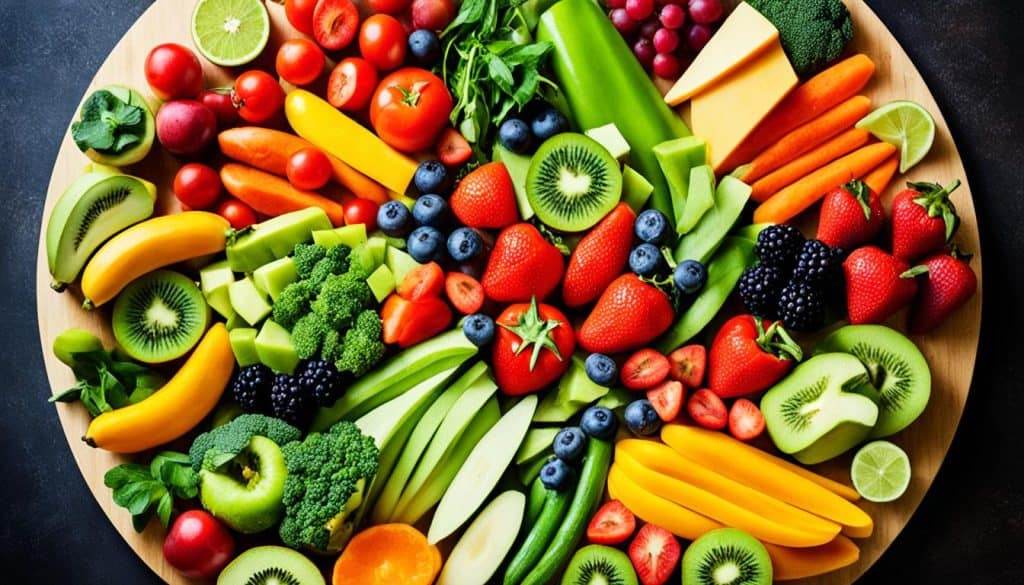Going vegan can be a big step, but it’s exciting and empowering. It’s great for many reasons, like being kind to animals, helping the planet, or improving your health. But, it’s key to watch what you eat to make sure you get all the nutrients your body needs.
Let me tell you a story about my friend Lisa. She became vegan for many good reasons and was thrilled to make a difference. But, she didn’t think about her nutrition at first.
Soon, Lisa felt tired and weak. She was worried, so she saw a dietitian. The dietitian looked at Lisa’s eating habits and found some big gaps. She wasn’t getting enough plant-based proteins, B12, vitamin D, or calcium. Her busy life made it hard to eat well, leading to health problems.
Lisa’s story teaches us an important lesson. Veganism is great, but you must focus on nutrition to stay healthy. Here are some tips for a balanced vegan diet:
Key Takeaways:
- Make sure you eat lots of fruits and veggies every day.
- Get enough protein with foods like beans, tofu, and quinoa.
- Remember to get B12, calcium, and vitamin D. Use fortified foods or supplements if needed.
- Watch how much sodium, sugar, and saturated fat you eat to keep your heart healthy.
- See a dietitian for advice and help as you start a vegan diet.
Living a vegan life is rewarding with tasty plant-based foods and health benefits. By focusing on nutrition and getting expert advice, you can make sure your vegan diet is caring, sustainable, and balanced.
Health Benefits of a Plant-Based Diet and Risks of an Unbalanced Vegetarian or Vegan Diet
Many people choose a plant-based diet for its health perks. Studies show it can lower the risk of chronic diseases like heart disease, type 2 diabetes, and some cancers. Let’s look at the health benefits and risks of an unbalanced vegetarian or vegan diet.
Health Benefits of a Plant-Based Diet
A plant-based diet can cut the risk of heart disease, the top cause of death in the U.S. Vegan diets are linked to a 22% lower risk of heart disease than eating meat. This is because they have less saturated fats and cholesterol.
These diets also help reduce inflammation in the body. Eating plant-based for 4 weeks lowers inflammation markers in people who are overweight or obese. Vegans also have lower levels of an inflammatory marker called C-reactive protein than meat-eaters.
Plant-based diets are great for preventing and managing type 2 diabetes. Vegans have a 2.9% type 2 diabetes rate, compared to 7.6% in meat eaters. This is due to more fiber, less saturated fat, and less weight gain.
They also help with weight control. Plant-based diets are linked to lower body weight and less weight gain over time. They’re full of fiber, which helps you feel full and eat less.
Risks of an Unbalanced Vegetarian or Vegan Diet
While a well-planned plant-based diet is good, an unbalanced one can be risky. It might lead to not getting enough vitamin B12, iron, and vitamin D.
Vegans often lack vitamin B12, found mainly in animal foods. Vegans need to get this vitamin from fortified foods or supplements. Iron and vitamin D can also be lacking, so careful meal planning and supplements may be needed.
An unbalanced diet that focuses too much on processed carbs is bad for health. It’s important to eat a variety of fruits, vegetables, whole grains, legumes, seeds, and nuts for all the nutrients you need.
Not eating a variety of plants can also harm your gut bacteria. This can increase the risk of chronic diseases like type 2 diabetes. So, eating a diverse and nutrient-rich plant-based diet is key.
By understanding these risks and planning a balanced plant-based diet, you can enjoy its many health benefits. Plant-based diets can improve health, lower disease risk, and help the planet.
Table: Health Benefits of a Plant-Based Diet and Risks of an Unbalanced Vegetarian or Vegan Diet
| Health Benefits | Risks |
|---|---|
| Lower risk of heart disease | Potential deficiencies in vitamin B12, iron, and vitamin D |
| Reduced inflammation | Imbalance in gut bacteria with limited variety of plants |
| Prevention and management of type 2 diabetes | Reliance on processed and quick carbohydrates |
| Weight management |
Source: American Journal of Medicine 2002, J Am Coll Cardiol 2017, Diabetes Care 2010

Getting the Necessary Vitamins and Nutrients as a Vegetarian or Vegan
As a vegetarian or vegan, getting all the vitamins and nutrients is key for your health. A well-planned plant-based diet is great, but you need to watch out for certain nutrients. Let’s look at some important vitamins and nutrients you should keep an eye on:
Necessary Vitamins and Minerals
1. Calcium is vital for strong bones and teeth. Vegans can get calcium from foods like cooked kale, collard greens, and fortified plant-based milks.
2. Vitamin D helps with bone health and calcium absorption. You can get it naturally from sunlight or from fortified foods like orange juice and plant-based milks.
3. Vitamin B12 is crucial for making red blood cells and nerve function. Vegans need to be careful because this vitamin is in animal products. Include fortified foods like plant-based milks and nutritional yeast in your diet or take B12 supplements.
4. Iron is key for carrying oxygen in the body. Foods like beans, broccoli, and tofu have iron, but eating them with vitamin C can help your body absorb it better.
5. Omega-3 fatty acids are important for brain and heart health. While fish is a common source, vegans can get them from flaxseed meal/oil. Sometimes, supplements are needed to get enough.
The Importance of Supplementation
Vegetarians and vegans might risk not getting enough vitamins B12 and D. Adding supplements or fortified foods can help fill the gap and meet your nutritional needs.
It’s also smart to watch your diet and talk to a healthcare professional. They can give you advice tailored to your health needs, especially if you’re pregnant, lactating, or have kids under 5.
Eating a variety of nutrient-rich foods and making smart choices will help you meet your nutritional needs. By focusing on the right vitamins and nutrients, you can enjoy the benefits of a vegetarian or vegan diet while staying healthy.

American Heart Association Resources – Provides beneficial information on vegetarian diets.
Next, learn more about starting a healthy vegetarian or vegan diet and finding support in Section 4.
Starting a Healthy Vegetarian or Vegan Diet and Finding Support
Before starting a vegetarian or vegan diet, make a nutrition plan. This ensures you get all the nutrients you need. It’s a good idea to talk to a healthcare professional or a registered dietitian, especially if you have health issues. They can offer great advice and support.
Getting support from others on a similar diet is very helpful. You can join online groups, find local vegetarian or vegan clubs, or take plant-based cooking classes. These can give you lots of tips, recipes, and a community to help you stay motivated.
When you’re starting out, take it slow. Begin by dropping one meat or animal product from your meals each week. Replace it with something plant-based. This way, your taste buds and body can get used to the new diet gradually.
Good meal planning is crucial for success. Try setting aside time on weekends to plan and shop for your meals. Having tasty and healthy meals ready can make sticking to your diet easier.

Getting creative with your meals is also a good idea. You can swap meat with tofu or tempeh in stir-fries, or use legumes in soups and stews. Adding lots of colorful veggies, whole grains, and plant-based proteins to your meals will help you get all the nutrients you need.
A vegetarian or vegan diet can be good for anyone, including kids, pregnant or breastfeeding moms, and athletes. But, it’s important to make sure you’re getting all the nutrients. Pay extra attention to getting enough calcium, vitamin D, vitamin B-12, iron, zinc, and iodine.
Start with small steps, get support, and plan your meals well. With these steps, you can easily switch to a healthy vegetarian or vegan diet. Remember, it’s all about making lasting changes that fit you and your body.
What to Eat for a Healthy Vegan Diet and Nutrients to Watch
Following a healthy vegan diet means eating a variety of plant-based foods. This ensures you get all the necessary nutrients. Let’s look at some key nutrients and the foods that provide them.
Protein: Protein is crucial and can be hard to get enough of on a vegan diet. But, there are many plant-based sources. Add beans, lentils, chickpeas, tofu, tempeh, and plant-based dairy like soy milk and yogurt to your meals for protein.
Omega-3 Fatty Acids: These acids are important for brain function, eyes, and the immune system. While fish is a common source, vegans can get them from ground linseed (flaxseed) oil, vegetable (rapeseed) oil, chia seeds, shelled hemp seeds, and walnuts.
Calcium and Iron: Without dairy, getting enough calcium and iron is key. Eat leafy greens like kale and spinach, calcium-set tofu, sesame seeds, and fortified plant milks for calcium. For iron, add pulses, wholemeal bread and flour, fortified cereals, and dark green veggies like broccoli and bok choy to your meals.
Vitamin B12: This vitamin is mostly in animal products, so vegans need to focus on it. Good sources include fortified cereals, unsweetened soya drinks, yeast extract, and nutritional yeast flakes.
By eating these nutrient-rich foods, you can make sure you’re getting enough protein, omega-3 fatty acids, calcium, iron, and other essential nutrients. This helps you live a healthy and balanced life.


